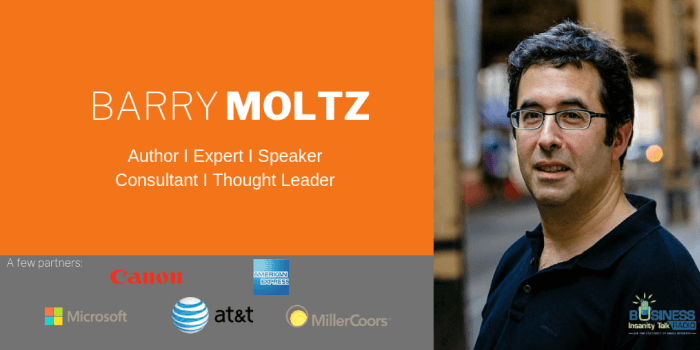Several construction business owners are masters of their work, but often making the transition from worker to foreman to owner can bring along uncertainty and confusion. Despite the priority of business owners being to solve a pain point, they are faced with challenges they never even dreamed of when running a business.
Reliant Funding is committed to assisting small business owners across all verticals achieve their dreams, and we reached out to one of the best in the business with the goal of providing actionable intelligence to small business owners across the US.
Recently we had the pleasure of speaking with Barry Moltz, the CEO and Founder of Barry Moltz. You may know him as the “unstuck guy”, and our discussion with him explores his advice and strategies for small construction business owners to employ and move forward.
Our full conversation is below. It has been edited for brevity and clarity.
The key takeaways from this discussion are:
- Have a strong marketing strategy. Don’t use marketing when business is slow and stop using it when business picks up. Marketing is a continuous effort.
- Keep communication flowing through social media and other forums.
- People are the most important part of your business. Reduce overhead cost by limiting hired staff and opt for contractors and freelancers for busy periods instead.
- Prepare for the future ahead, now.
- Use content marketing. Keep your potential clients updated through emails, social media, and constant reach out to keep your business on their mind.
- Make the shift to technology and tools.
- Increase flexible expenses.
- Take small steps and make one change at a time.
Reliant: Thanks for speaking with us today. When we deal with small business owners we constantly hear stories of how they got into their business, how they struggled in the process and how they eventually overcame everything. Can you provide our readers with some background on how you founded Barry Moltz the unstuck guy and more about how you help businesses get unstuck and move forward?
Barry: I started my career with IBM and I always wanted to be president. After 10 years, I ran into a sales manager and after lunch with him, I decided to start my own business. The first business, I ran out of business and the second business I was kicked out by my two partners, and the third business I was fortunate enough to sell-payback the bank the $1.3 million we owed them.
That’s when I thought to myself, I need a break from this. I started an angel fund 5 years, started speaking and writing and now I have my own radio show. I do a lot of influencer marketing trying to help small business owners get unstuck and figure out their next steps.
Reliant: Congratulations on having recently released your sixth book “Small Business Hacks 100 Shortcuts to your Success”. You’ve created 5 books already, what was the driving factor behind this release, what are the problems you’re focusing on today?
Barry: There’s a lot of advice on the web and a lot of the advice is not given by people like myself who’s actually gone through it. The reason that I work so well with small business owners is cause I’ve had three of my own businesses and gone through everything a business does.
Most owners don’t know how to negotiate a real restate lease, or trademark a name for the business. And they shouldn’t have to go through issues like this because they got into the business to solve a problem and now they have all these other things to deal with. That’s why I thought we needed a book of advice which was just someplace to go in seven steps or less and solve the uncommon business problems that owners face.
Reliant: What are the areas that people generally get stuck in, and need help with getting unstuck and moving forward? Though each business is different, most of the time they undergo the same problems.
Barry: Usually, people are usually stuck at three different areas; the first is sales and marketing. Most of the time, there are small businesses, they don’t consistently do sales and marketing. They only do sales and marketing when they have no business, but as soon as they get business they stop doing sales and marketing so we try and work with them to put together a sales and marketing strategy, that can go on regardless of whether they’re busy or not. The second place where people get stuck, is around people.
Too many folks, especially entrepreneurs, are the center of the business and they haven’t been able to find and leverage in hiring other people and retaining them so they can actually have a company and now have a job, and the third one is people are busy but they’re not productive. They’re constantly getting interrupted all the time and when they sit in everyday they don’t get the things done that are important to their business.
Reliant: What are the common challenges business owners face and have you seen any change in this economy? Or is it sort of the eternal things are always eternal?
Barry: Depending on where we are in the economy, things get better or worse. For example, with unemployment being so low the biggest problem that small business owners face is hiring and retaining excellent people for their business. Most businesses are not about ideas, they’re about the execution of those ideas so they’re all about people
.One factor that is a little bit better is the access to capital. While banks still don’t lend money to people who need it, there are now alternate sources of financing especially online where you can now get loans fairly quickly and in a very short period of time, and we think that’s what’s helped a lot of business owners because they’re no longer waiting on the banks.
Reliant: We work with a bunch of different industries and there are a lot of universal problems and there are ones that are very specific to the construction industry. What do you think their common challenges are and what can they do to overcome them?
Barry: Many folks again, are faced with that skilled labor shortage where they can’t get people actually do the work. This is interesting because during really great economies, there’s so much construction going on that actually there isn’t enough capacity. Then, when you go through a recession, there’s so much capacity, and not enough work. A lot of construction business owners I know complain about the rising cost of material, especially from our current administration’s tariffs.
Lumber and steel are going up and they’re not really sure how that’s going to end. People are holding onto their money as long as possible and they’re hesitant to adopt to technology by working in the cloud and really move their business to the next level. .
Reliant: Are there any easy steps, for not just construction business owners, but any business owner to familiarize themselves with upcoming technology and the cloud before they sort of jump in with two feet? What should they consider before making that move?
Barry: Cash flow is one of the issues for small businesses the more that business owners can do invoicing and billing online and actually accept electronic payments, then you’re not waiting for the checks in the mail kind of thing and that’s probably the first kind of thing to work on you know to speed up the slow invoicing and payment.
If you manage inventory, online tools can help you see what inventory you have, how quickly the inventory turns, what your reorder time and quantity should be, and help track all your raw materials. If you’re in construction, time tracking is great, because even if you have people on jobs, they can actually record their times and what they’re working on, on their phones and gives you a live picture of what it’s going to cost you.
Reliant: Do you have any advice for any construction business owner out there or business owner in regards to how recent updates in tax codes will be affecting their small business and what they should be on the lookout for in the future?
Brady: Most small business owners are in for a rude awakening coming April 15th because they thought they were going to get more of a tax refund and lower taxes but they’re going to realize that they’re actually going to have to end up paying more taxes. If you license your name on buildings, your tax will be lower this year.
This will be disappointing especially for those that live in the blue states that have higher property taxes, higher sales taxes, higher interest rate mortgages and a higher limit to their deductibiliy. Every business owner has to talk to their accountants this year about whether they should stay as, or move forward to become a C corporation which is straight 20% taxation.
Reliant: Any rules, tips thoughts that you could give to any business owner on maintaining a budget, and how do they run it as a business owner, which is a little bit different than running it as a head of household?
Barry: Business owners need to put together a budget twice a year-once in December and relook at it again once in June. What’s important is to take a look at last year and see what things you’re going to do differently this year that are actually going to change the revenue and expense. The problem is too many business owners don’t take a look at their financial statements every single month so they’re really running blind. You really can’t run your business without data and this is some of the most important data you need to get.
Reliant: Are there any tools you’d advice for small businesses trying to set up a budget?
Barry: What we would suggest is if you have a service-oriented business that you would use Quickbooks Online. Its something available very readily, very easily, a lot of people can share it and you can put together a budget and it will run statements that will go against that budget. I wouldn’t say Quickbooks is the best for all businesses and you might want to look at other tools that might save things. Using inventory is a little more sophisticated, you may want to use a little more sophisticated product.
Reliant: How do you market your business without free-giveaways for because you’re in construction and you’re trying to get that big contract so how do you market your business there?
Barry: People buy in service businesses because they have a pain and want someone to solve that pain. You never know when someone’s going to solve that pain so you need to be there all the time. We mean that’s why content marketing is so important because you’re constantly reminding someone to remember your brand, and if they refer you so you get in the “maybe pile”. The “maybe pile” is a list of 2 or 3 people that they’re gonna consider before they do this job and if you’re in the maybe pile you got a 33% chance of getting picked and if you’re not in the maybe pile, you have a 0% chance of getting picked.
So it’s really important that you do these social media reinforcements either through social or email or other kinds of marketing. For example, I’m now building a house in Arizona and I’ve come across a lot of architects, and builders and when I finally decide to build, only the people who have stayed in touch with me those are the people I thought of. The people who haven’t stayed in touch with me, we have no idea who they are.
Reliant: We all know Entrepreneur, Forbes, SmallBizTrends that do general stuff. When you’re a construction owner, where can you look for more targeted advice?
Barry: Various social media tools like Linkedin and Facebook and find the groups that are talking about the construction business or the specific business you’re in. Find out what questions people have, what they’re talking about. You and just put the problem you’re solving in the search engine and participating in forums will build you credibility.
Reliant: What should business owners look out for in the year ahead?
Barry: Well we would first take a look at the Fed interest rate, and the feds say they’re going to keep interest rate constant to the end of the year so we would think that’s good news for anyone doing building. So we think we’re good for 2019. But in line with the construction business what we gotta start thinking about is” How long can this ride last?” We’ve been going on for about 10 years now which is 3 years longer than economic expansion lasts. So somewhere along the line, there’s going to be some sign of a downturn and keeping your expenses flexible. At this point, we believe we gotta be prepared for what’s going to happen in 2020, or 2021.
Reliant: Can you give us an example of the concept of flexible expenses?
Barry: Well for service-oriented companies, we think that they’re biggest expense is people. So if you can have a minimum amount of overhead is people and hire freelancers or contractors to work on various projects for you, that’s going to work out better than having these people on staff all the time. Now, what you’ll lose with that is well maybe you won’t have those people when you need them. So what we like to see is a core of hired people and then freelancers or contractors during the busy times support those core people.
Reliant: Do you have any final parting words of wisdom for anyone that you think they should be aware of?
Barry: We spoke on a lot of different things and what I would suggest is to take one small idea and see if you can include it in your business because successful people don’t take as large a leap across the chasm. They take patient small steps where they make one small change and based on that, they make another small change and that’s what we would encourage people to do.
Reliant: And my guess is that’s how they get unstuck and moving forward right?
Barry: A little bit at a time.







